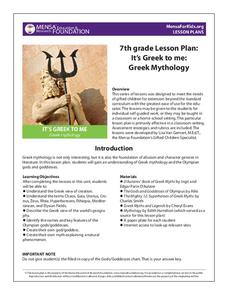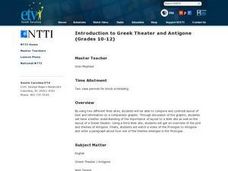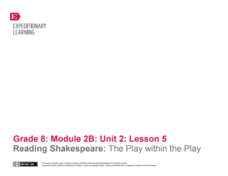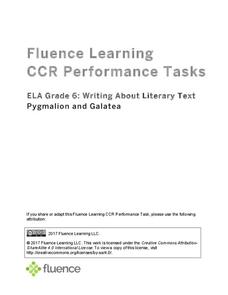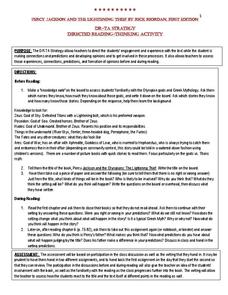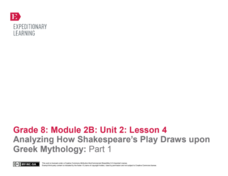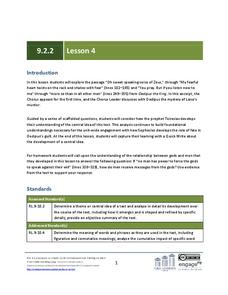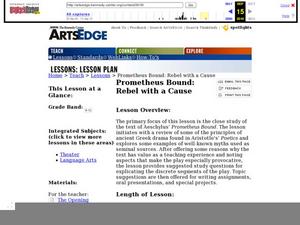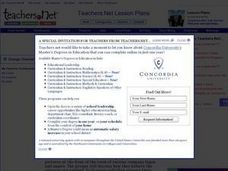MENSA Education & Research Foundation
It’s Greek to Me: Greek Mythology
It's no myth: this packet on Greek mythology is an excellent addition to your social studies curriculum. With writing activities, such as short answer responses and biopoems, and reading activities, which include creation stories and...
EngageNY
Analyzing How Shakespeare’s Play Draws upon Greek Mythology: Part 2
Pupils explore the narrative structure of a piece of literary text, mapping out the plot structure of the Greek myth "Pyramus and Thisbe." Next, they use their completed graphic organizers to write story summaries.
EngageNY
Summarizing Complex Ideas: Comparing the Original UDHR and the "Plain Language" Version
The eighth lesson plan in this series continues the focus on vocabulary and increasing young readers' awareness of academic language. Pairs of learners participate in a short vocabulary review activity called Interactive Words in which...
Oxford Cambridge
Classical Greek: Set Text Guide Sophocles Antigone
Check out this 21-page text guide if Sophocles' Antigone is part of your course content. Packed with background information, suggested talking points, and activities, the guide is a must-have for instructors using the Greek tragedy.
Curated OER
Introduction to Greek Theatre and Antigone
Students compare and contrast a website layout and the layout of a Greek theatre. In this Greek theatre lesson, students research the Greek theatre and produce a bulleted list of five facts about the Greek theatre. Students complete a...
EngageNY
Reading Shakespeare: The Play within the Play
Scholars continue reading the Greek myth "Pyramus and Thisbe," analyzing why it was written into Shakespeare's A Midsummer Night's Dream. Next, they complete a Venn diagram to compare the two texts.
Fluence Learning
Writing About Literary Text: Pygmalion and Galatea
Is it crazy to fall in love with your own work, or is that the purest love of all? Compare two renditions of the classic Greek myth Pygmalion and Galatea with a literary analysis exercise. After students compare the similarities and...
Curated OER
The Lightning Thief: Directed Reading-Thinking Activity
Before diving into the engaging tale of Percy Jackson and the Lightning Thief by Rick Riordan, conduct this directed reading and thinking activity. Assess your pupils' knowledge of Greek gods and mythology through a knowledge web, and...
EngageNY
Analyzing How Shakespeare’s Play Draws upon Greek Mythology: Part 1
Scholars read the story "Pyramus and Thisbe," analyzing word choice, tone, and meaning. They then try to find the gist of the story and discuss how Shakespeare used the myth in his play A Midsummer Night's Dream.
EngageNY
Analyzing How Shakespeare’s Play Draws upon Greek Mythology: Part 3
How do the narrative and play versions of the myth "Pyramus and Thisbe" affect meaning? Scholars reread Act 5, Scene 1 from Shakespeare's A Midsummer Night's Dream and compare its structure to "Pyramus and Thisbe." Next, they use a...
Core Knowledge Foundation
Greek And Latin Root Words
Students examine Greek and Latin root words. They research the history of the English language, solve word games and puzzles, write paragraphs about the impact of Greek and Latin on the English language, and create flip chart study guides.
EngageNY
Grade 9 ELA Module 2, Unit 2, Lesson 4
The concept of sight, whether it's a lack of sight or abundant sight of the future, plays a vital role in Sophocle's Oedipus the King. Develop your ninth graders' literary vision with a lesson that connects the prophecy of Teiresias to...
EngageNY
Grade 9 ELA Module 2, Unit 2, Lesson 19
Now that readers can see the full scope of Sophocles' Oedipus the King, they can draw connections between the dramatic ending and the textual evidence throughout the Greek tragedy. As they prepare for the unit assessment writing prompt,...
EngageNY
Grade 9 ELA Module 2, Unit 2, Lesson 3
The manipulation of time is one of the most essential elements in Sophocles' Oedipus the King. As your language arts class participates in a jigsaw discussion activity, they work together to analyze the play's plot structure and...
EngageNY
Leaving the Play: All’s Well That Ends Well
How does Shakespeare develop the theme of control in A Midsummer Night's Dream? Using the resource, scholars analyze the theme of parental control in the play and the Greek myth "Pyramus and Thisbe." Next, they talk to partners to...
Curated OER
Prometheus Bound: Rebel with a Cause
If you are teaching Aeschylus' Prometheus Bound, you can't afford to miss this source. An extensive list of ideas outlines numerous discussion topics, writing prompts, comprehension questions, oral presentations, and projects. Have class...
Art Institute of Chicago
Lesson Plan: A Writer’s Odyssey
Looking for a fresh approach to an end-of-unit project for The Odyssey? Check out a resource that has class members write their own hero's journey short story and then craft an illustration that depicts their tale. Apollonio di...
Novelinks
The Lightning Thief: Concept/Vocabulary Analysis
Before you begin reading Percy Jackson and the Lightning Thief by Rick Riordan, read over this comprehensive handout that gives you a plethora of information regarding the story's summary, organizational structure, central...
Curated OER
Sophocles' Antigone: Ancient Greek Theatre, Live from Antiquity
Students analyze Antigone and its universal issues as well as explore ancient Greece. In this Antigone and Ancient Greece lesson, students read and complete activities for Sophocles' Antigone. Students reconstruct the experience of a...
EngageNY
Reading Closely to Build Background Knowledge: “Myths and Legends”
That is a myth! Scholars take a look at Greek myths referenced in The Lightning Thief. As learners listen to stories in Myths and Legends, they imagine the sights and sounds described. Pupils then talk with partners about specific words...
Curated OER
Impact of Greek Mythology in Today's World
Students explore world logos and names of companies and relate them to Greek myths. Events real and imagined are examined and their effects on later cultures are discussed.
Curated OER
Now You're Speaking My Language; Deciphering the Symbols of Early Civilizations
Young scholars explore early attempts at written language. In this early civilizations lesson plan, students investigate first attempts at written communication. Among the civilizations covered are Mayan, Greek, and Egyptian.
KIPP 3D Academy
Epic Poetry Unit
The Odyssey is the core text in this unit study of the hero's journey motif. Along the way, kids research Greek and Roman history, mythology, art, and epic poetry. The 104-page packet is perfect for homeschool or classroom situations and...
EngageNY
Exploring Allusions to Myths in The Lightning Thief: Close Reading Part 1 of “Prometheus”
It's all just an allusion. Scholars learn the meaning of allusion and read an allusion in The Lightning Thief. Learners gather in their triads and discuss questions from the text to take a close look at vocabulary words and choose an...
Other popular searches
- Language Arts Greek Heroes
- Powerpoint Greek Language
- English Greek Language
- Learn Modern Greek Language
- Modern Greek Language
- Ancient Greek Language
- Teaching the Greek Language
- Language Arts Greek Mythology
- Learning Greek Language


